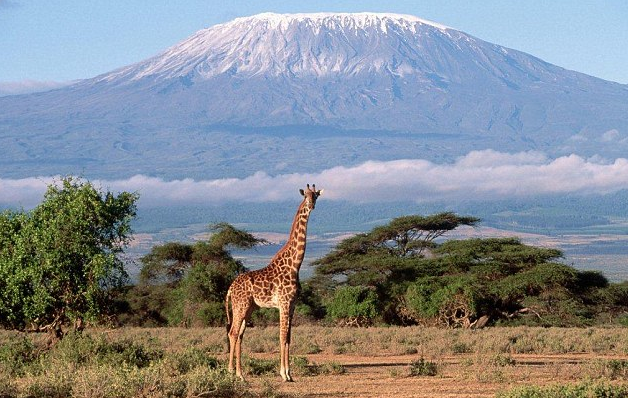|
A year ago my good friend Rona sent me an email from the Thames Valley Air Ambulance with details of a fundraising challenge: to climb Kilimanjaro. 'Wanna do it?' she asked. 'Sure,' I said. It's easy to say yes to something when it's over a year away and you haven't really researched what is involved.
It was about 6 months after signing up that I thought perhaps I should look into what climbing Kilimanjaro involved. In my head it was a big hill. How hard could it be? Apparently quite hard. Suddenly, to quote some American gangsta, 'Shit got real.' Turns out Kilimanjaro is actually 5,895 metres high. It's the world's highest freestanding mountain. In terms of altitude, its peak sits at the top end of the extreme altitude category and just below the 'Death Zone' category. So that was comforting. I decided it was time to get a bit more organised about this expedition. I wrote a list of what I needed to get sorted or learn more about:
Training How do you train to climb up a very steep mountain when you live in one of the flattest places in the country? I had a session with a personal trainer who gave me exercises that focused on my butt, quads and calves. I sort of did those (a bit - probably should have done more of them). I went walking with increasing regularity and added weight to my pack. I borrowed an elevation training mask from a friend and climbed Sutton Bank (the one hill near me) in an attempt to recreate the lack of oxygen I'll have on Kilimanjaro. I joined a gym and spent time on the cross trainer. But not as much as I should have due to a miserable series of cold and flu. And I climbed the Yorkshire Three Peaks as a final bit of hill action. Do I feel as fit as I should be? No. Will I manage? I hope so. Kit This was what kept me awake at night. How do you pack for a walk that starts in 30C heat and ends in temperatures around -20C? And it needs to be waterproof and insulated and lightweight as you're only allowed a maximum of 15kg. Just when you think you have everything someone tells you not to forget spare batteries or a head torch or hand warmers or knee supports. I feel as though I have a permanent post-it pad being scribbled on in my brain. I have borrowed a huge amount of kit from a friend who did it last year, but have also spent a small fortune on new stuff. I will do a separate post on kit because there is so much to cover. Suffice to say, you will spend an inordinate amount of time (and money) in outdoor shops fondling goretex. As for packing, it takes serious skills and thought to pack everything you need into a small space that is still convenient. You will spend HOURS attempting different packing techniques and will eventually come to the conclusion that two pairs of knickers for a week is fine. Passport and visas I had to renew my passport as you need to have at least 6 months left on your passport to travel. Then you need a visa for Tanzania, which is simple enough to get by downloading the form off the Tanzanian's embassy's website and posting it off. It costs £40. But timing is critical. If you send it off too far in advance, it will be out of date. If you don't send it off early enough, you risk not getting it back in time. Aim for 6 weeks before departure date. We also need transit visas for Kenya as we are spending over 12 hours there. You can get these here online. You will need a transit visa for the way there and the way back. It costs $20 each way. Vaccinations You need to get to a travel health clinic to find out what vaccinations you need. You will get conflicting information. In short, if you are travelling to Tanzania via a Yellow Fever country (like Kenya) you need a Yellow Fever Vaccination certificate. Other jabs you should get are Hep B, not available on the NHS and cost £42 each, unless you get them combined with Hep A (but you won't be able to get that if you've already had the Hep A jab at some point in the past). I also got Typhoid and the combined Diptheria, Tetanus and Polio jab, which are given free on the NHS. Be sure to get these done well in advance. Fundraising You can climb Kilimanjaro without raising money for a cause. But many of the treks are arranged by charities. I am raising money for the Thames Valley Air Ambulance Service. You can donate here. This takes a good deal of effort. It's not fun asking friends and family for money. It's even harder to do it when the charity you're supporting isn't in the local area you live in. But it's worth doing and serves as a motivator to keep going. There are many ways you can raise funds - from holding events, raffles and holding collection buckets. Or you can just email all your friends and do shout outs on social media. All of this takes time and effort. Itineraries, flights and money Your tour operator will probably arrange your flights for you, but we opted to use airmiles and booked our own. If you're heading to Africa and gorgeous Tanzania, then you'd be mad not to add a safari to your trip. We had the option of using our expedition organiser's add on safari, but as we had inside contacts, we arranged our own. But you need to factor all of the travel time and logistics into your planning. You also need to account for the extra dosh this will cost you, including the tips for the porters on the hike and the safari guides. I will be taking $500 with me in the hope that this covers what I need. But my point is, when you're doing your sums, this is another financial thing to factor in and it has to be on your dime. It's entirely separate from any fundraising you do. Insurance It's always comforting when you need to take out special insurance to cover you for hiking up to 6,000 metres with helicopter evacuation....But that's what you need. Luckily my travel insurance does cover me for that but it took many calls for me to confirm that I was DEFINITELY covered for this. Childcare If, like me, you are a mother and have children who are going to need looking after while you're off having your Kilimanjaro adventure, you are going to need to arrange childcare. It's not easy if you don't have grandparents around to help or a partner who can adapt their work to fit around school hours and kids. But if you want to do it, you will make a plan. Just remember to factor in the additional costs for any additional childcare costs you have to pay for. Also, don't worry about the kids being heartbroken without you there. THEY WILL BE FINE. Please believe me. You are setting an example to them that life is about living and having adventures, so please don't beat yourself up about this. Medication and health Who would have thought that a 7 day hike up a hill could require quite so much thinking about health. You will need anti-malarials. You may want to get Diamox, a drug that helps with altitude sickness. You probably want to start taking probiotics to help your gut deal with unusual food and water. Vitamins and gingseng to give you a boost will help too. If you're a woman, you will want to give thought to how you manage your periods while you're up the mountain. Get a coil fitted many months in advance, take a tablet to stop the bleeding, work out which sanitary product is going to be least inconvenient to use should it happen. You will also need to consider what you do about having to pee countless times during the night. I suggest one of these. Altitude sickness I've listed this separately from the rest of health because it is the thing that will wake you up at night in a panic. The distances you cover every day in Kilimanjaro aren't long. And yes it is all up hill (or downhill at the end) and yes you are sleeping in a tent and using very basic toilet facilities. But all of that doesn't really register on the fear scale. It's the fact that we will be going somewhere that has far less oxygen than our bodies are used to that terrifies me. I've listened to plenty of advice: walk slowly, drink a lot, keep eating, take Diamox if you need it (but only in the morning otherwise you'll pee even more), take paracetamol. Expect to have a headache. Expect nausea. I now fully expect that I will at some point feel awful. I just really don't want to get the severe version of it - High Altitude Pulmonary Oedema (HAPO) or High Altitude Cerebral Oedema (HACO). You can read up more about it here. Bottom line: there is nothing you can do about it. If you're affected, you're affected. Walk slowly, drink and hopefully all will be fine. So if you are thinking about climbing Kilimanjaro, just be aware that there is a lot of work to do before you even take your first step. I have been told that summit night is the most challenging thing - both physically and mentally - you will ever do. Getting to this point feels as though it has been a challenge in itself. But that was never going to stop me. Life is about pushing yourself out of your comfort zone and doing things that may be uncomfortable at the time, but will be the memories you treasure most. So go for it. Join the Glamoraks community of women who love to walk, hike and have adventures.
1 Comment
Ann Greig
15/2/2017 05:46:43 pm
Sounds very scary Melissa, I hope it all goes well for you. Everything of the best, we will be thinking of you all the time.
Reply
Leave a Reply. |
Categories
All
Archives
July 2024
|
Get social. Follow us.
|
Don't get left out.
Add your email to be alerted about any Glamorak events, walks, get togethers, challenges or news.
Success! Now check your email to confirm your subscription.


 RSS Feed
RSS Feed